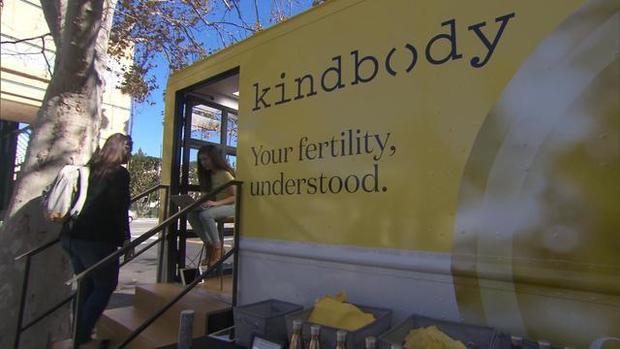When model Krista Mays found herself single in her early 30s with a goal of being a mom by age 35, she decided she’d have to find a less traditional approach to motherhood.
“I was having a conversation with my girlfriends about egg freezing and fertility and the conversation I had was like, ‘I think I’m going to do this. I don’t know anything about it. I don’t know what offices to go to like, how do I look up on the computer fertility clinic that wants somebody like me?'” Mays told CBS News’ Dana Jacobson.
She came across ads for a company called Kindbody on Instagram, a fertility startup known for bright yellow vans offering blood tests to measure the Anti-Müllerian hormone, or AMH, which is thought to be a marker of a woman’s remaining egg supply.
When Mays found out her AMH was low at .78, she went to have more testing done at Kindbody’s New York City clinic. That’s when she decided to freeze her eggs. Doctors were able to retrieve seven eggs, and with them, the hopes of a baby.
“For me, it was taking the opportunity to ensure that I’ll have children regardless of my relationship situation,” Mays said.
Kindbody is one of a growing crop of companies suggesting young women protect themselves against future infertility. The company’s founding physician, Dr. Fahimeh Sasan, talks to a packed room of young women at monthly “egg freezing 101” events. She said ads that say “freezing eggs is like freezing time” are not misleading.
“If your natural fertility is going to start to decline in your mid-30s, by freezing your eggs, you’re giving yourself the gift of time,” Sasan said. “Egg freezing is not a guarantee to motherhood. However, in a woman who is having difficulty conceiving, if she happens to have eggs that are from her younger healthier better quality version of herself, it will be easier for her to get pregnant than if she, who is having fertility issues, tries to use her own eggs at that time.”
According to the American Society for Reproductive Medicine, the rate of women between the ages of 40 to 44 becoming first-time moms has been rising since the early 80s. The reasons include careers, a less-than-ideal relationship status, or finances.
Asked if women in their 20s really need to be concerned with their fertility, Sasan said, “Concerning means I’m trying to scare you into something and that’s definitely not the process. I want you to be aware of it because I think that knowledge is power.”
At about $6,000, Kindbody’s CEO and founder Gina Bartasi, said one egg-freezing cycle, not including medication, costs far less than at some major fertility centers and could mean more savings if a woman requires in vitro fertilization later.
“If you measure the cost of having a child with your frozen eggs … and you compare it to multiple failed rounds of IVF, every single time, the one cycle with those frozen eggs yields a better outcome and a more affordable solution,” Bartasi said.
But not everyone is on board. Dr. Pasquale Patrizio, the director of the Yale Fertility Center, worries about startups baiting young women with flashy ads and AMH testing.
“If there are issues, a reproductive endocrinologist should be the person that should be providing all this information to women and not entrepreneurs,” Patrizio said. “For the great overwhelming majority of women in their young age, there is no reason to offer a single that by itself is completely inefficient and only generates fear and panic.”
But Dr. Sasan said Kindbody makes it clear that the initial test in the yellow van is not meant to be diagnostic.
“AMH is a piece of the puzzle … some of the other pieces are one, just going over your medical history then an antral follicle count which is a special type of pelvic ultrasound or sonogram where we can actually count the number of follicles which are basically premature eggs,” Sasan said.
There isn’t much data on the long-term safety and effectiveness of planned egg freezing, especially when it comes to eggs that were flash-frozen using a relatively new technique called vitrification.
One 2017 study suggested a 34-year-old woman with 20 frozen eggs is expected to have a 90 percent chance of having at least one live birth. A 42-year-old is expected to have a 37 percent chance.
Krista Mays said she will likely go through two more rounds of egg freezing because she is hoping for more than one child.
“My goal kind of that we’ve talked about with my doctors is freezing 20 eggs … it is an investment, but I felt like it’s a justified investment,” Mays said. “Because this is my backup plan … if I don’t have a partner, and I can’t do it the natural way … then, you know, my next option would be to do this.”
